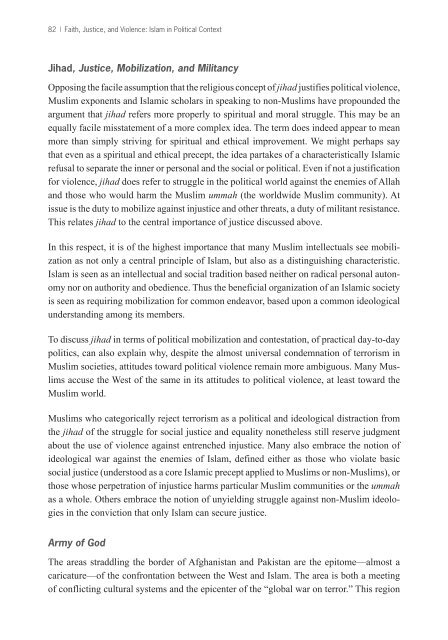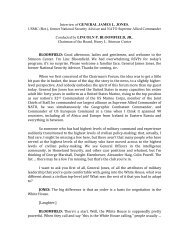Islam and Politics - The Stimson Center
Islam and Politics - The Stimson Center
Islam and Politics - The Stimson Center
Create successful ePaper yourself
Turn your PDF publications into a flip-book with our unique Google optimized e-Paper software.
82 | Faith, Justice, <strong>and</strong> Violence: <strong>Islam</strong> in Political Context<br />
Jihad, Justice, Mobilization, <strong>and</strong> Militancy<br />
Opposing the facile assumption that the religious concept of jihad justifies political violence,<br />
Muslim exponents <strong>and</strong> <strong>Islam</strong>ic scholars in speaking to non-Muslims have propounded the<br />
argument that jihad refers more properly to spiritual <strong>and</strong> moral struggle. This may be an<br />
equally facile misstatement of a more complex idea. <strong>The</strong> term does indeed appear to mean<br />
more than simply striving for spiritual <strong>and</strong> ethical improvement. We might perhaps say<br />
that even as a spiritual <strong>and</strong> ethical precept, the idea partakes of a characteristically <strong>Islam</strong>ic<br />
refusal to separate the inner or personal <strong>and</strong> the social or political. Even if not a justification<br />
for violence, jihad does refer to struggle in the political world against the enemies of Allah<br />
<strong>and</strong> those who would harm the Muslim ummah (the worldwide Muslim community). At<br />
issue is the duty to mobilize against injustice <strong>and</strong> other threats, a duty of militant resistance.<br />
This relates jihad to the central importance of justice discussed above.<br />
In this respect, it is of the highest importance that many Muslim intellectuals see mobilization<br />
as not only a central principle of <strong>Islam</strong>, but also as a distinguishing characteristic.<br />
<strong>Islam</strong> is seen as an intellectual <strong>and</strong> social tradition based neither on radical personal autonomy<br />
nor on authority <strong>and</strong> obedience. Thus the beneficial organization of an <strong>Islam</strong>ic society<br />
is seen as requiring mobilization for common endeavor, based upon a common ideological<br />
underst<strong>and</strong>ing among its members.<br />
To discuss jihad in terms of political mobilization <strong>and</strong> contestation, of practical day-to-day<br />
politics, can also explain why, despite the almost universal condemnation of terrorism in<br />
Muslim societies, attitudes toward political violence remain more ambiguous. Many Muslims<br />
accuse the West of the same in its attitudes to political violence, at least toward the<br />
Muslim world.<br />
Muslims who categorically reject terrorism as a political <strong>and</strong> ideological distraction from<br />
the jihad of the struggle for social justice <strong>and</strong> equality nonetheless still reserve judgment<br />
about the use of violence against entrenched injustice. Many also embrace the notion of<br />
ideological war against the enemies of <strong>Islam</strong>, defined either as those who violate basic<br />
social justice (understood as a core <strong>Islam</strong>ic precept applied to Muslims or non-Muslims), or<br />
those whose perpetration of injustice harms particular Muslim communities or the ummah<br />
as a whole. Others embrace the notion of unyielding struggle against non-Muslim ideologies<br />
in the conviction that only <strong>Islam</strong> can secure justice.<br />
Army of God<br />
<strong>The</strong> areas straddling the border of Afghanistan <strong>and</strong> Pakistan are the epitome—almost a<br />
caricature—of the confrontation between the West <strong>and</strong> <strong>Islam</strong>. <strong>The</strong> area is both a meeting<br />
of conflicting cultural systems <strong>and</strong> the epicenter of the “global war on terror.” This region

















